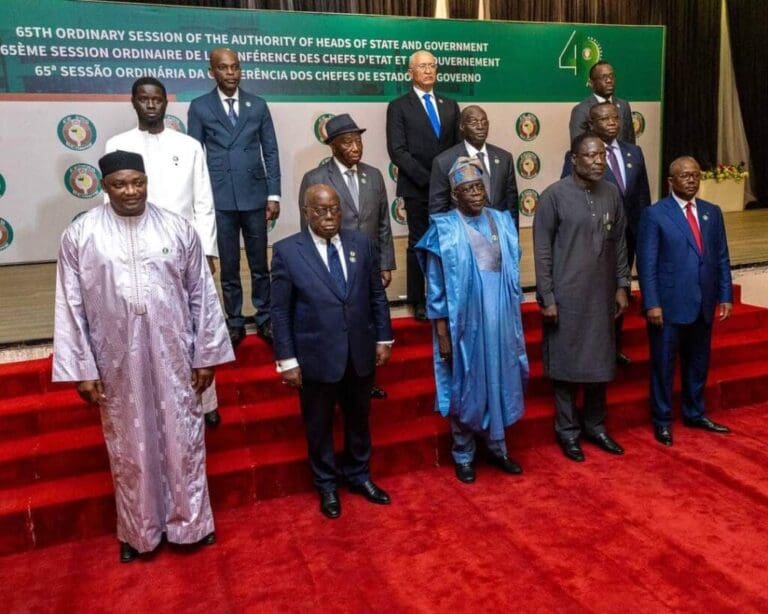The Alliance of Sahel States, which became a confederation on Saturday, July 6, 2024, has reiterated its desire to sever ties with ECOWAS.
The 65th Ordinary Session of the Conference of Heads of State and Government of the Economic Community of West African States (ECOWAS) was held in Abuja, Nigeria.
Chaired by Bola Tinubu, President of Nigeria, the session addressed various political issues, with a particular focus on relations with the Alliance of Sahel States (AES).
The Conference expressed “its disappointment at the lack of progress in interactions with the authorities of Burkina Faso, Mali and Niger,” members of the AES. In response to this situation, the Conference appointed Bassirou Diomaye Diakhar Faye, President of Senegal, as ECOWAS Facilitator in the discussions with the AES, in collaboration with his Togolese counterpart Faure Essozimna Gnassingbe.
At their first summit, held in Niamey on July 6, 2024, the Heads of State of the AES reaffirmed their irrevocable decision to withdraw from ECOWAS without delay. This declaration, although worrying, was approached with a willingness for dialogue and mediation on the part of ECOWAS, in order to find lasting solutions to existing tensions.
The Conference also asked the Commission of the Community organization to draw up a forward-looking contingency plan to deal with all eventualities in relations with the AES. This plan must take into account the requirements of article 91 of the revised ECOWAS Treaty of 1993 and include measures to strengthen cooperation and collaboration between the various regional and continental bodies.
In his opening speech on Sunday, July 7, the President of the ECOWAS Commission, Dr. Omar Alieu Touray, underlined the serious consequences of the withdrawal of AES member states from the organisation.
He pointed out that such a withdrawal would weaken the region’s collective capacity to deal with security and economic challenges and risk further isolating these countries on the international stage. Added to this are the restrictions on the free movement of people and goods that could also be imposed on the citizens of these countries within the ECOWAS zone.
The Conference reaffirmed its commitment “to maintain constructive relations and to pursue mediation efforts to resolve disputes.”
In a strong decision, the Conference also demanded the “unconditional release” of the former president of Niger, Mohamed Bazoum, currently in detention since his overthrow nearly a year ago.
ECOWAS also continues to place democracy and good governance at the heart of its priorities. To this end, the Conference welcomed the Commission’s efforts to revise the 2001 Additional Protocol on Democracy and Good Governance. Consultations with Member States will continue in order to finalise this revision, thereby strengthening the constitutional order in the region.
In The Gambia, the Conference urged the government to speed up the adoption of the new Constitution, while in Ghana, it encouraged an inclusive and transparent electoral process for the December 2024 general elections.
Faced with persistent challenges such as terrorism and transnational crime, the Conference reaffirmed its commitment to eradicating these threats. To this end, it intends to activate a 5,000-strong regional force, starting with a 1,650-strong brigade. Consultations will be facilitated to mobilise the necessary resources for this initiative, with the aim of strengthening security and stability in the region.
The Conference also approved the organisation of a special Summit on the future of regional integration in West Africa, taking into account regional and global political and security dynamics. This summit will provide an opportunity to reflect deeply on the relationship between electoral processes, democracy and development, and to intensify efforts to achieve the objectives of Vision 2050.
MD/ac/fss/GIK/APA


